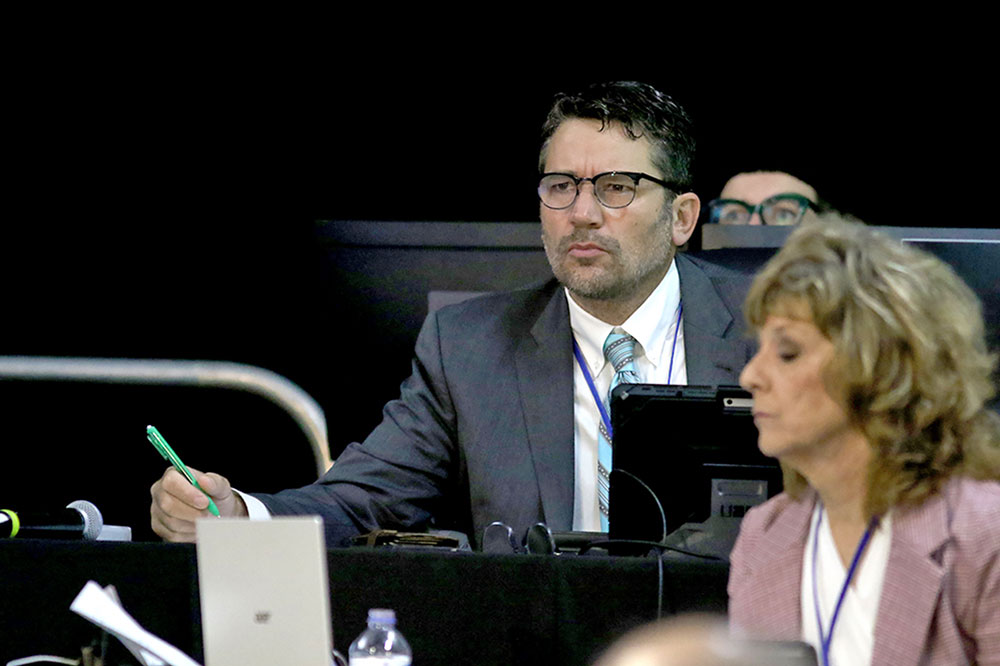Grassley visits Zoetis in Charles City for employee Q-and-A

By Travis Fischer, tkfischer@charlescitypress.com
U.S. Sen. Charles Grassley visited Charles City for an afternoon Q&A session with employees at Zoetis on Wednesday, April 4.
As part of his regular annual 99-county tour of the state, Grassley picked the venue to give the workers there an opportunity to have their questions answered without missing work, he said.
“I go to where people can come to me,” said Grassley as he introduced himself to the crowd.
Most of the questions in the Q&A session were agriculture related, beginning with asking about Grassley’s thoughts about the development of lab grown meat and its viability as a substitute for animal meat.
“I suppose a free-market person really doesn’t stand in the way of innovation in the free market, but I’m not really interested in eating lab meat,” said Grassley.
He did say he was in favor of making sure such products are properly identified for consumers.
“If it comes from the cow, it’s milk. If it doesn’t come from a cow, it’s not milk,” said Grassley. “You can call it anything you want to, but you can’t advertise it as milk. It’s the same way with meat. That’s the sort of legislation that I back from time to time.”
In another ag market matter, Grassley weighed in on California’s Proposition 12, a referendum adopted by the state that limits the sale of pork from producers that don’t meet specific crating requirements. With California serving as 15% of the pork market, the state law shuts out pork producers that don’t comply out of a substantial portion of business.
“If we don’t do something about it quick, there’s a lot of smaller pork producers that know that they can’t spend the money to do what you have to do to sell in California,” said Grassley. “They’re probably going to sell out and you’ll have greater concentration of pork production nationally.”
Passing in 2018 and going into full effect on Jan. 1 of this year, Prop 12 faced several lawsuits from the pork industry, culminating in a Supreme Court case that was decided in its favor in May of 2023.
“We thought the Supreme Court would take care of it,” said Grassley, explaining that the decision ruled that it was Congress’ role to regulate commerce across state lines. “So then they tossed it back to us.”
Grassley said that efforts to pass a federal law that would overrule Prop 12 face an uphill battle in Congress due to the lobbying power of animal rights organizations.
“We got people that know nothing about agriculture that are telling us how to raise our animals in Iowa,” said Grassley, expressing concern that other states will also come up with their own regulations. “How are we going to raise pigs if you’ve got 50 different ways of marketing pigs?”
On the topic of small farmers, Grassley discussed programs and incentives that can help small farm operations survive in an ever consolidating industry, stating that he is working on a tax incentive to help retiring farmers pass their farms on to a willing young farmer if keeping it in the family isn’t an option.
He also mentioned tax exempt bonds that can be distributed through the state, incentives for organic farming, and other programs through the USDA, though he said those may need additional funding.
“We have programs I don’t think are very effective because they don’t have enough money in them, but there is a Department of Agriculture program for young beginning farmers,” he said.
Grassley was also asked about national issues like immigration and the national debt.
Grassley tried to dispel the notion that federal programs are providing illegal immigrants with better benefits not available to legal residents.
“I would imagine that a lot of those benefits … probably some of them, except for emergency room health care that everybody is entitled to if it’s a true emergency, probably don’t qualify for anything else,” said Grassley, noting that may not be the case for programs at the state level, local government, or non-profit organizations.
At the same time, Grassley agreed that more should be done to stem what he called the recent spike of illegal border crossings.
According to the Pew Research Center, the number of unauthorized immigrants living in the United States has been dropping since its peak in 2007, stabilizing in 2017 through 2021. Migrant encounters at the US-Mexico border followed a similar trend, but have spiked since the end of the COVID-19 pandemic, resulting in sometimes more than 200,000 apprehensions per month.
Stating that President Biden has decided to not enforce immigration law, and voting in February against a border security deal that he said would give Biden greater discretionary power on border policy, Grassley said that the only mechanism Congress has at its disposal to address the issue would be impeachment.
“And you’d never get two-thirds vote in the United States Senate to impeach President Biden,” he said.
Addressing the national debt, Grassley explained the mechanics behind the federal government’s $34.6 trillion dollar debt and how much more debt the government can amass without consequences.
“As long as you, or people elsewhere in the world, have confidence that investing in Treasury bills is a good investment. That’s how long it continues,” said Grassley. “Once that stops we’re going to have hyperinflation.”
Stating that “it’s not the dollars, it’s the relation to the economy to accommodate that,” Grassley explained that the national debt had dropped substantially after World War II, leveling out at about 35% of the United State’s gross national product.
According to the U.S. Treasury’s website, the debt was at a historic low of 32% when Grassley entered office in 1981. Since then, that percentage has gradually increased, raising to 50% in the 1980s, crossing 60% in the 1990s, rising again to 100% in the wake of the 2007 recession, and spiking as high as 132% during COVID. In 2023, the debt measured 123% of the gross domestic product.
To reign in spending, Grassley commended the work that former Speaker of the House Kevin McCarthy did in negotiating spending limits with Democrats before being ousted by his party last year.
“McCarthy, when he was still speaker, reached an agreement for the next two years that we won’t spend more in this year we’re in than we spent last year, and only a one percent increase in ’25.”
Beyond that, Grassley said he will continue to support a constitutional amendment that mandates a balanced budget, calling it the only way to get sound fiscal policy.
Grassley is currently working a Pharmaceutical Benefit Managers bill to control drug prices and the next iteration of the farm bill, though he does not expect the bill to pass this year.
“A five-year farm bill is very, very important, but I don’t think it’s going to happen this year,” said Grassley.
Grassley anticipates that the 2018 Farm Bill will be given a one-year extension, but is concerned that version of the law isn’t sufficient for today’s economic environment.
“We’ve got to increase the safety net for farmers and that’s too low in the 2018 farm bill,” said Grassley.








Social Share